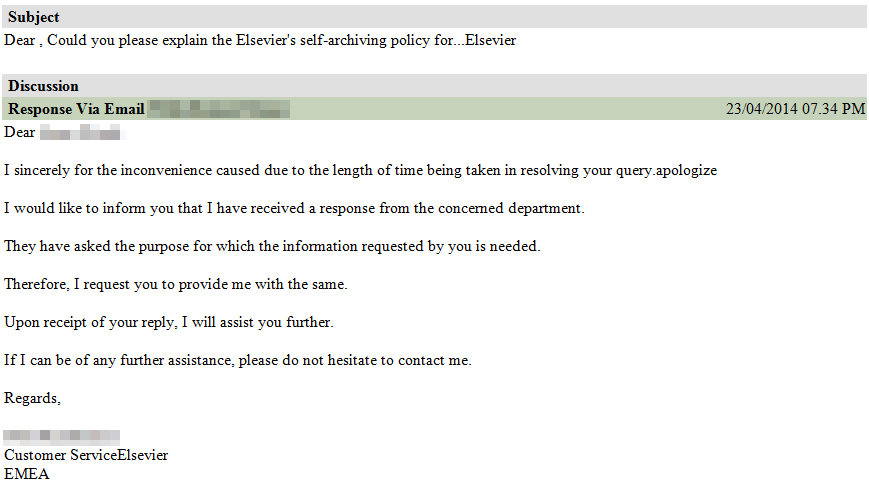Elsevier’s Green Open Access policy on self-archiving is so confusing even the Elsevier Customer Service department don’t know what it is.
A few weeks ago one of my colleagues was trying to find out whether they could self-archive a paper published in an Elsevier journal in our institutional repository. The normal procedure is to check the SHERPA RoMEO database, followed by looking at the journal’s webpages. In this particular case there was no information from either sources:
Given the lack of information my colleague took the reasonable step of contacting Elsevier via their ‘Help & Contact’ web form on 7th April 2014 to ask what is the self-archiving policy for the Journal of Geriatric Psychiatry. The following response was received (names have been pixelated to preserve anonymity):
The same response was sent again on 16th and 22nd April. Finally my colleague received the following email asking why they wanted to know:
So far it has taken 12 working days to not answer a simple question.
If Elsevier’s customer support staff don’t know what the Green Open Access policy of one of their own journals is then how is an academic author supposed to find out?
As it turns out the journal in question has a 12 month embargo period. After digging round the Elsevier webpages we found the information is buried in a link to a PDF.
The length of embargo periods is a contentious area. Most reasonable people would agree that a period of exclusivity is required for publishers to reap some financial benefit from their subscription-based business model. The majority of UK based funders of research (Research Councils and Charities) recognise this and typically implement a 6 month time period in their open access policies to accommodate any journal embargo periods. It is telling to note that many hybrid publishers have increased journal embargos to periods longer than those recommended by research funders. This in effect forces many researchers to choose paid for open access services offered by publishers.
UPDATE
After more than 3 weeks the enquiry was finally passed to the correct Customer Support Team who provided a full satisfactory response on 30 April 2014:
Please accept my apologies that your original enquiry dated 7th April has just been brought to the attention of the Open Access Customer Support Team. I believe that your enquiry was regarding an explanation as to ‘s self-archiving policy for The American Journal of Geriatric Psychiatry and the relevant embargo period, but to date you have yet to receive a full response. I would like to provide you with the following information.Elsevier
The process in which an Author can share their research by self-archiving a draft copy to a repository or website, is referred to as Green Open Access. The following link will provide you with full information and clear instructions as this approach to Open Access http://www.elsevier.com/about/open-access/green-open-access. The website also provides clear details of ’s journal specific posting policy Elsevierhttp://www.elsevier.com/about/open-access/open-access-policies/article-posting-policy and confirms that the embargo period for this journal title is 12 months.


